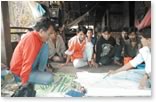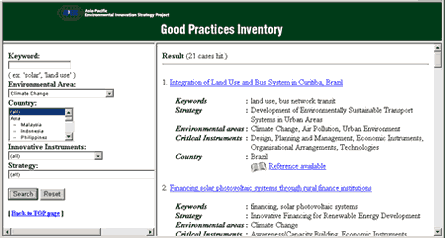|
|
 |
 Home >
RISPO Home >
RISPO |
| |
|
|
|
|
|
|
 |
 |
The Research on Innovative and Strategic Policy Options (RISPO) sub-project
will develop a Good Practices Inventory and Strategic Policy Options to encourage sustainable development in the Asia-Pacific region. Four
research themes were selected for initial focus: |
|

 |
Promoting eco-markets and eco-industry |
 |
Developing innovative urban systems |
 |
Appropriately using community resources |
 |
Networking stakeholders for action. |
|
|
 Under these four themes, eight sub-themes were selected for
the first phase of APEIS (Table 2). International teams of researchers
in the Asia-Pacific region are developing the tools, collecting
examples of good practices, and exploring policy options for
each sub-theme.
Under these four themes, eight sub-themes were selected for
the first phase of APEIS (Table 2). International teams of researchers
in the Asia-Pacific region are developing the tools, collecting
examples of good practices, and exploring policy options for
each sub-theme. |
|
RISPO's approach differs from that of the other
sub-projects. While IEM and IEA  take
a relatively large-scale, bird’s-eye view approaches, RISPO
emphasizes ground-based field studies of successful examples
of sustainable development practices. By taking this approach,
RISPO intends to develop a sound understanding of the factors
that promote or hinder sustainable development in various settings
and to describe the lessons thus learned. take
a relatively large-scale, bird’s-eye view approaches, RISPO
emphasizes ground-based field studies of successful examples
of sustainable development practices. By taking this approach,
RISPO intends to develop a sound understanding of the factors
that promote or hinder sustainable development in various settings
and to describe the lessons thus learned. |
|
| Table 2: Themes and Sub-themes of RISPO |
| Themes |
Sub-themes |
| Promoting
Eco-Markets and Eco-Industry |
Innovative financing
for renewable energy development |
| Creation of inter-boundary
markets for recyclable materials |
| Improving environmental
performance of small and medium-sized enterprises
(SMEs) |
| Developing
Innovative Urban Systems |
Development of environmentally
sustainable transport systems in urban areas |
| Appropriately
Using Community Resources |
Promotion of biomass
energy |
| Facilitating community-based
tourism in protected areas |
| Networking
Stakeholders for Action |
Promoting environmental
education by NGOs |
| Promoting local/indigenous
knowledge-based resource management |
|
|
|
 |
 |
 |
 |
|
|
 |
 |
 |
 |
 |
Good Practices Inventory (GPI) |
|
One of the most important tasks of RISPO is to
disseminate lessons learned from a wide variety of successful
sustainable development practices. The inventory is designed
to help overcome the lack of information on such practices in
the region. It will serve as a storehouse of accumulated experiences
and a platform for information sharing and discussion. |
|
The inventory is an easily searchable database
on the RISPO website (Fig.16). Information on each good practice
includes critical and innovative instruments leading the practice
successful, lessons learned, and potential for application.
General criteria for selecting the specific cases include; |
|
- Contribution to positive change using nonconventional
approaches;
- Use of indicators for visible or measurable change;
- Demonstration of innovative and replicable / applicable
approaches.
|
|

|
|
Fig.16 Prototype Good Practices
Inventory |
|
 |
 |
 |
 |
 |
Strategic Policy Options (SPO) |
|
Collecting a wide variety of good practices will provide a base of various
options applicable to the geographically, socially, culturally and economically
diverse countries of the Asia-Pacific region. Based on the examination
of the good practices collected, RISPO will develop Strategic Policy Options. |
|
The Strategic Policy Options mainly targets policy-makers at local, national, sub-regional and/or regional
levels as its primary audience. Options will be developed for each sub-theme
of RISPO research areas highlight the keys to success, steps and policy
measures to be taken to implement the option, the roles of various stakeholders
in implementing the option, and possible alternatives under different socioeconomic
conditions. |
|
The Strategic Policy Options may include proposals on strategic approaches to the issues of concern, policy options, and action plans focusing on the following components: |
|
 |
Technology measures (development,transfer,
diffusion) |
 |
Financial measures |
 |
Governance (regulatory measures, institutional
arrangements, capacity building) |
 |
Awareness raising and partnership |
|
|
Capacity Building and Pilot Projects |
|
RISPO recognizes the importance of providing capacity
building opportunities for stakeholders to apply these tools,
as well as to demonstrate the feasibility of the options through
pilot projects. While most capacity building activities will
be activated after March 2004, some are being undertaken prior
to this. |
|
 |
 |
 |
 |
 |
RISPO Achievements in 2002 |
|
RISPO initially focused on organizing an international research team to
collaboratively work on the eight research subthemes and to develop the
prototype Good Practices Inventory. |
|
Examples of good practices collected so far include: |
 |
 |
Economic incentive
policy to stimulate the growth of market for small-sized
wind turbine (China) |
 |
Beyond recycling with asset management and
de-manufacturing (The Philippines) |
 |
Demonstration and dissemination of cleaner
technologies in the small-scale glass industry (India) |
 |
Introduction of electric three-wheelers
in Kathmandu (Nepal) |
 |
Use of rice husks as fuel in process steam
boilers (India) |
 |
Creative actions of the environmental conservation
group, Ban Wang Lung, at Khao Luang National Park (Thailand) |
 |
An NGO environmental education network (Indonesia) |
 |
A indigenous knowledge-based reforestation
project (Vietnam). |
|
|
Key indicators were identified for the quantitative
assessments of policy measures in some of the RISPO sub-themes
such as biomass energy use and environmentally sustainable transportation. |
|
CONTENTS
OF GOOD PRACTICES INVENTORY (EXAMPLE)
DEVELOPING A MARKET-ORIENTED INSTITUTIONAL AND FINANCIAL
MODEL FOR DISSEMINATION OF DECENTRALIZED SOLAR SYSTEMS,
INDIA |
| Summary of the Practice : |
 The
Uttam Urja project is developing a grassroots Energy Service
Network that consists of a local NGO, dealers and retailers
of solar systems, financial intermediaries, and local
manufacturers of solar systems. It represents a package
of energy products and services for rural areas rather
than mere provision of a product alone, as was done in
various government schemes. The Uttam Urja project demonstrates
how the limitations of subsidy driven programs can be
overcome with respect to local technology customization
and delivery mechanisms. The
Uttam Urja project is developing a grassroots Energy Service
Network that consists of a local NGO, dealers and retailers
of solar systems, financial intermediaries, and local
manufacturers of solar systems. It represents a package
of energy products and services for rural areas rather
than mere provision of a product alone, as was done in
various government schemes. The Uttam Urja project demonstrates
how the limitations of subsidy driven programs can be
overcome with respect to local technology customization
and delivery mechanisms. |
| Critical Instruments : |
| The Uttam Urja project combines a unique
institutional model, technology, and awareness and capacity
building to showcase the commercial viability of solar
system markets. |
| Impacts : |
| Between 1999 and March 2003, close to 1000
domestic lighting systems and solar panels were sold without
the need for government subsidy, partnerships with protected
area authorities. |
| Lessons Leaned : |
| Setting up local assembly and dissemination
systems can reduce product and service costs; customers
are willing to purchase at real market prices without
subsidy) if products and services are of high quality;
instead of upfront subsidy to customers, effort should
be placed on facilitating entrepreneurial initiative and
provision of soft credit to customers. |
| Potential for Application : |
| The grassroots Energy Service Network provides
an easily replicable model that builds on previous experiences. |
|
|
 |
 |
 |
 |
 |
RISPO Major Progress in 2003 |
 |
 |
Research collaboration network with research institutes, universities,
and NGOs in the Asia Pacific Region. |
 |
Preliminary version of Good Practice Inventory on internet with approximately
100 cases. |
 |
Framework of strategic and Strategic Policy Options for 8 sub-themes. The
Strategic Policy Options database will become available on the web by March
2005. |
 |
Collaboration with the IEA to assess the impacts of Strategic Policy Options.
More Details in RISPO Technical Summaries 2004 (PDF) |
|
|
 |
 |
 |
 |
 |
 |
RISPO Major Progress in 2004 |
 |
 |
Research collaboration
network with research institutes, universities, and NGOs
in the Asia-Pacific Region. |
 |
Final version of Good Practice Inventory
on the RISPO website with approximately 140 cases |
 |
Framework of Strategies and Strategic Policy
Options(SPOs) under 8 sub-themes. The database on the
RISPO website with approximately 80 SPOs |
 |
Scenario analysis in collaboration with
the IEA to assess the impacts of Strategic Policy Options
More Details in RISPO
Technical Summaries 2005 (PDF) |
|
|
 |
 |
 |
 |
|